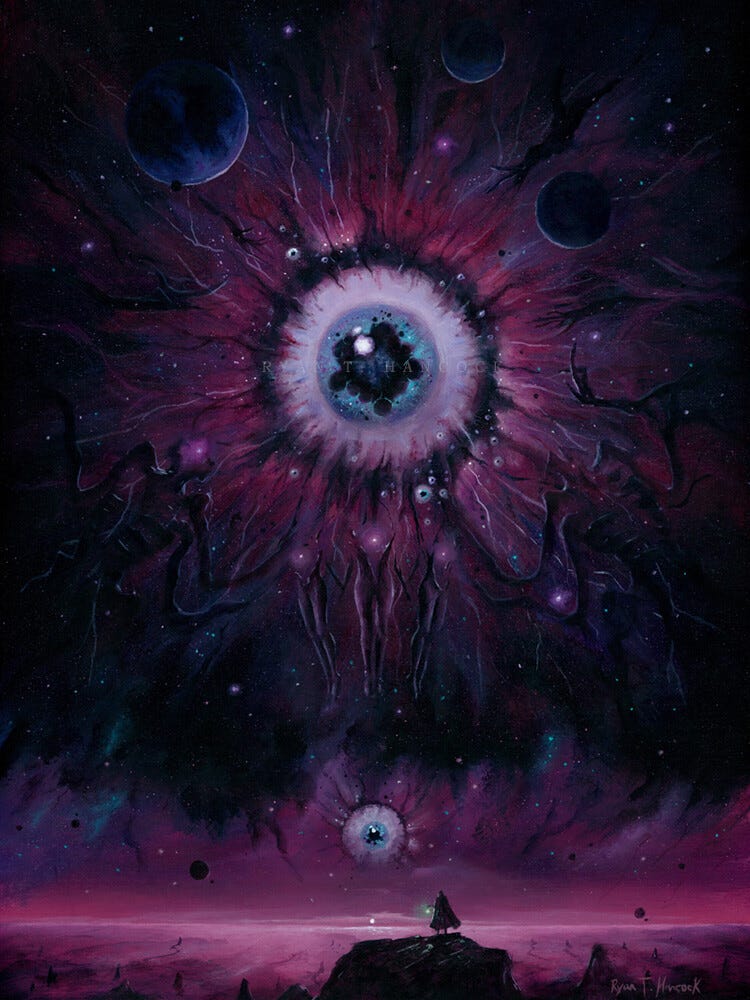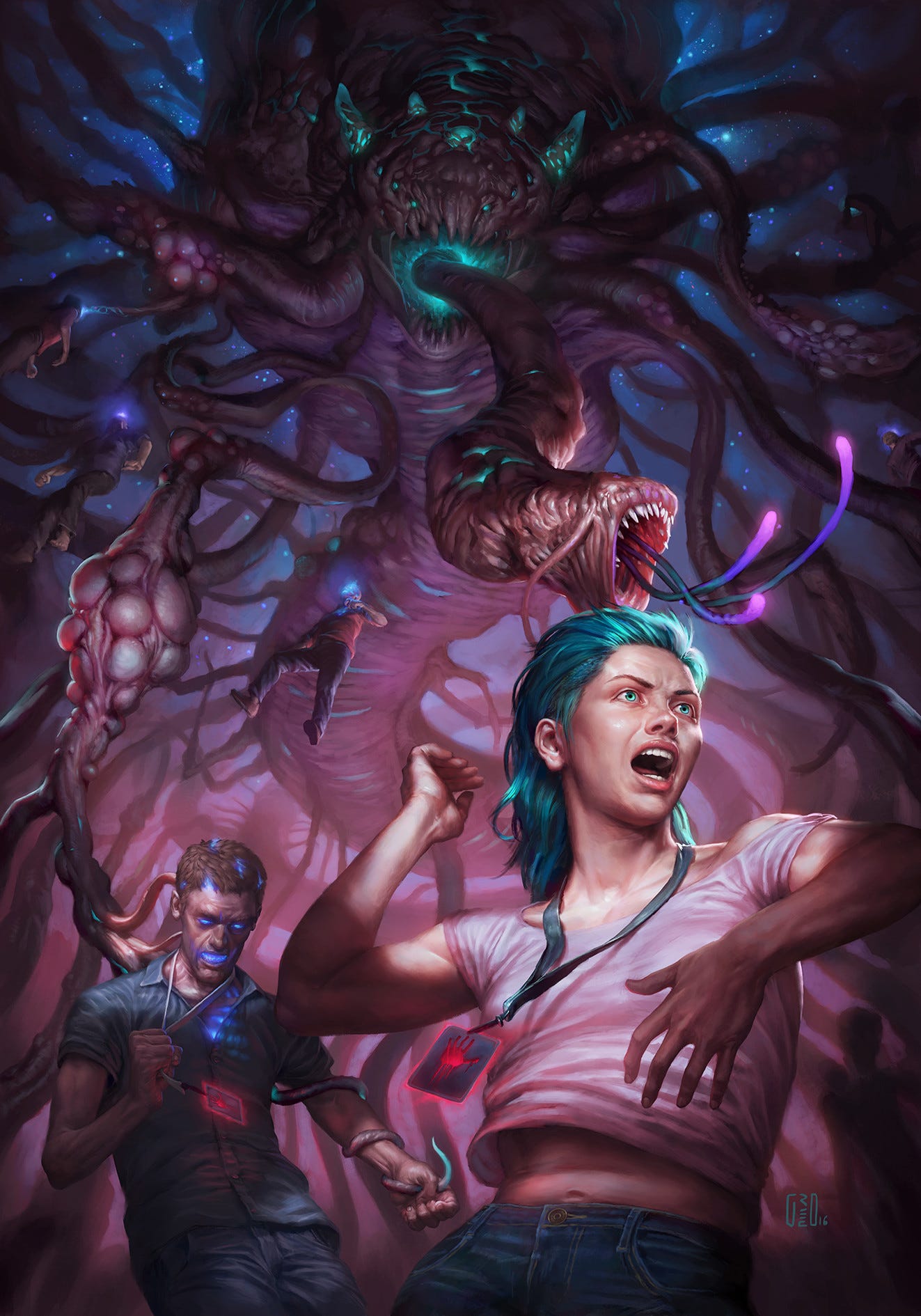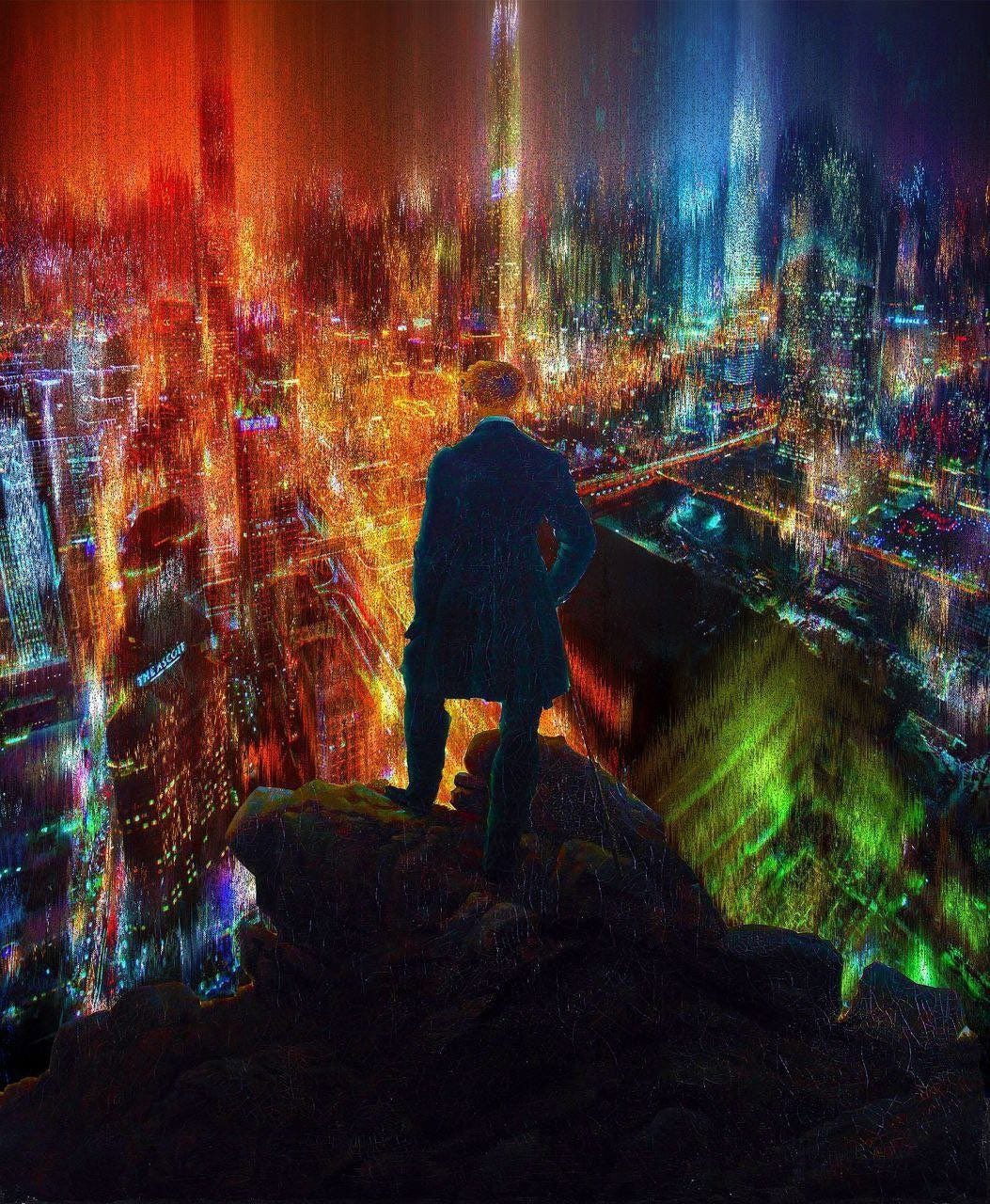The Eye at the End of History
The deranged imagination that falsifies the past also freezes the future
We are afflicted with a great looking-backwards.
The future is a terrifying place, offering us nothing but a gradual stripping away of everything that makes life on Earth good, a steady intensification of everything that already makes our lives here intolerable. Less autonomy, more control. Less privacy, more surveillance. Less beef, more bugs. Less sex, more porn. Less reality, more virtuality. Less life, more technology ... technology, that sour promise that so many now spit out as a curse.
When the future promises only suffering and indignation, it is natural to look to the past, and indeed the past has become an obsession. Even our science fiction is nothing but remakes, reboots, alternate timelines, prequels, an endless drone of resampled retro soundtracks.
But when we look to the past, we cursed sons of this age, what do we see? What is it that we clockwork oranges are shown?
Oppression, suffering, injustice, patriarchy, sexism, misogynoir, homophobia, rayycist power structures of colonial exploitation and plantation slavery. We are only allowed to see the bad, and even that which is not so bad is presented as such. Period dramas in sepia and Medieval epics in blue filters, emphasizing the monochromatic misery of the unenlightened past.
So we are caught between the rock of an awful history, and the hard place of an unbearable future, trapped in an eternal present where these twin temporal horrors grind down on our souls like millstones.
It was not always thus. Within living memory the future was a place of hope, and the past regarded with fondness and joy. It’s worth speculating as to why this change occurred. Many will blame muh economy, and no doubt the petrodollar and the inflation of fiat by the central banksters played their roles1. Others will say, it is the exhaustion that comes with the atomized alienation of materialistic, mechanized modernity. Me, I suspect a dark working was performed on 9/11 that threw an umbra over our world, one which paralyzed us within this awful and eternal present, pinning the wings on which we fly through time to the mat with spikes of terror and psychic trauma.
We cannot imagine that anything good can come from anything bad. If our heritage is only original sin and nothing else, the future must be condemned too. It becomes fixed – the inevitable triumph of the beast system, the UN Sustainability Goals, Agenda 2030, you know the drill, we all do. And so we retreat from that future, and rather than allowing our imaginations to roam free as they probe ahead to chart our course through the great cosmic probability wave, in our pain and derangement we reimagine the past. To see it as it should be, as we think it should be – a place free of sin, where Our Values of tolerance and inclusion have always reined supreme, where warriors were all Strong Independent Women and Achilles and Zeus and Anne Boleyn were POCs.
But this is all the grossest error. The future is not fixed. The past is. By inverting this we falsify both. By insisting that the past must be the way we wish it to have been2, it becomes impossible to learn from it. Like a narcissist overcoding his selfishness with heroic victimhood so thoroughly that he convinces himself of his fantasies, we guarantee only that we will continue to repeat the same destructive patterns, and make it all the more sure that our future will be a ruin.
All knowledge is historical. This is true even of your immediate sensory impressions. The rays of light that bring the world to your mind travelled to your eyes through a boiling quantum foam that puts a hard limit to their speed of motion. You only ever see the world as it was.
Knowledge brings perspective. The greater one’s perspective, the further one can see. Which is to say, the further one can see clearly into the past, the further one can see clearly into the future, for while the future is never the same as the past, it will be made of the same stuff, and so the same patterns will repeat.
But to see into the past clearly is not merely some bloodless act of quantification, of counting potsherds and measuring the depths of strata in which they are found. It is an act of love. To love something is to see it for what it is, and to accept it for what it is, not in spite of whatever you may think its flaws to be, but also because of those flaws. To see both good and bad, and to see how the bad was also in its way, good. To understand that the tragedy is a necessary counterpoint to the comedy, that without the strife and horror of war the noonday summer of peace would not be nearly so strong and sweet.
When we gather the past into ourselves in this fashion, when we rehabilitate it not by projecting our own prejudiced desires onto it and insisting it conform but rather see it unfiltered for what it really was, the clouds lift from our eyes. We no longer stand condemned by the merciless Eye at the End of History, for after all we are that Eye, always have been, and always will be. The past can become again a place of grandeur and wonder, of lessons that we gather into ourselves, distilling them into a heady liquor that intoxicates without stupefying.
With the past rehabilitated, our imagination will again be free to perform its proper function: to probe ahead into the uncharted future, the infinite unwritten, to see not only what must or may come, but most importantly to chart the course of our growth into it, so that we may become who and what we want to be, and not what evil men tell us we must.
I would be remiss if I did not note that this piece was inspired by the essay History in Service to Life by the brilliant neo-Hellenist
, to whom you should most certainly subscribe.If you enjoyed this essay, you’d probably have a great time in Deimos Station, a private slack for paid subscribers to Postcards From Barsoom and many other excellent Substacks, where we discuss a wide range of fascinating topics - above all, how to reclaim our human future.
In between writing on Substack you can find me on Twitter @martianwyrdlord, and I’m also pretty active at Telegrams From Barsoom
And who is we, kemosabe?









I've been wondering lately about how dour the left has become, how miserable, how the past for them has become nothing but one long story of oppression, while their future requires the near total destruction of everything we have grown accustomed to, in favor of a renewable utopia where we are all trans, there are no borders or boundaries, yet there is no hierarchy because no one is oppressor or oppressed, that otherwise looks somehow like eternal progress, more or less exactly like the consumer lifestyle of the managerial class. Destroying everything on the way to utopia is easy, but that also assures the utopia never comes. The cognitive dissonance is deranging. I don't think we have reached anything like the bottom on liberal madness at this point.
Meanwhile I have never felt so optimistic. It is an incredibly creative time, for those who are open to it.
A true revelation for me was Collingwood's insight that knowing the past is an imaginative act: we need to try our best to feel, know and experience the history we study from the perspectives of those people in the past. That is, combine knowledge about the past with adopting the belief systems of those who lived in other eras. For that, we need to grow ourselves and understand ourselves in the present. It's a feedback loop that leads to a liberating sense of deep understanding of the human condition, although of course we can never fully achieve perfection. To love the past, and people, in that way, may unlock a brighter future.